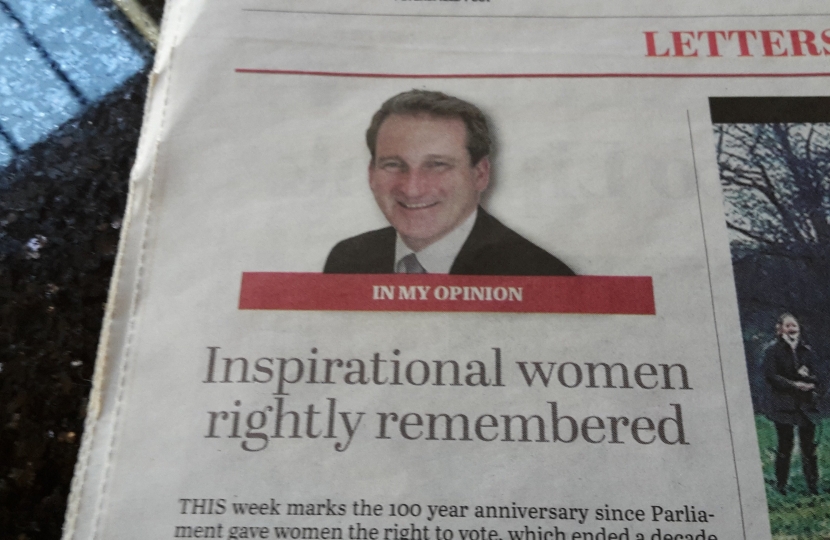
Damian writes a regular column in the Petersfield Post, and today's theme is the centenary of women getting the right to vote:
"This week marks the 100 year anniversary since Parliament gave women the right to vote, which ended a decade of often radical campaigning by suffragettes across the country.
The daring actions taken by some of the most revolutionary activists are well remembered today, including the death of Emily Davison as she ran into the path of the King’s horse at the 1913 Derby. Prior to that day, Emily had been jailed eight times, been on hunger strike seven times and was subjected to force-feeding almost 50 times.
Women of all classes were mobilised by two key groups – the Women’s Social and Political Union founded by Emmeline Pankhurst in 1903, and the National Union of Women’s Suffrage Societies led by Millicent Fawcett. They not only shook the political and social establishment of the day, but their campaigns have been acknowledged as some of the most effective of the 20th century.
The trigger for change came towards the end of the First World War, as thousands of men who had been absent from home for more than a year automatically lost their vote. The government was forced to act, and had to acknowledge the enormous role played by women in the war effort.
So, on the 6th February 1918, women aged 30 or over - with certain qualifications - were given the right to vote. And the passing of new legislation in November 1918 allowed women to stand for Parliament.
Although Nancy Astor became the first woman to take a seat as a Member of Parliament in 1919, the progress of women into senior political positions has been much more recent. It wasn’t until 1929 we saw the first female cabinet minister, after Margaret Bonfield’s appointment as Secretary of State for Labour, and it took until 1979 for the election of our first female prime minister.
Baroness Boothroyd became the first (and so far, the only) female Speaker of the House of Commons in 1992, and it was just last month when the first female Muslim minister, Nusrat Ghani, spoke at the House of Commons despatch box.
Closer to home, the lives and work of four inspiring local women will be celebrated this week at an event hosted by the Petersfield Museum. These include Amy Garrett Badley who founded Bedales School with her husband, eminent musical conductor Kathleen Merritt, local artist Flora Twort, and Tiffany Francis whose recent success as an author has caught the imagination of many.
And, of course, many other successful and pioneering women have made a mark in East Hampshire, including writer Flora Thompson who lived and worked in Liphook, and Chawton’s own Jane Austen. The endurance of Austen’s appeal continues and was recently celebrated with the 200th anniversary of both Northhanger Abbey and Persuasion, both published posthumously in December 1817.
Our prime minister – Theresa May – has been a strong advocate for women in politics, co-founding Women2Win in 2005, and as she said this week, this age of the internet and social media also presents new challenges: we need to make sure public life is not made inhospitable for any group.
I was much encouraged that 11 of the 12 local students that took part in the Taste of Parliament event I hosted last October were all female, but we still have a way to go to make the House of Commons fully representative.
Included in the government’s centenary plans is the commission of a statue of Millicent Fawcett for Parliament Square – the first female to be given this honour – and a fitting tribute to the extraordinary courage of the women who fought for the right to vote, and an inspiration for those who continue to fight for female equality today.
For details of events celebrating the centenary, please go to: https://www.parliament.uk/get-involved/vote-100/"
Article written by Damian Hinds and published in the Petersfield Post on Wednesday 7th February 2018

